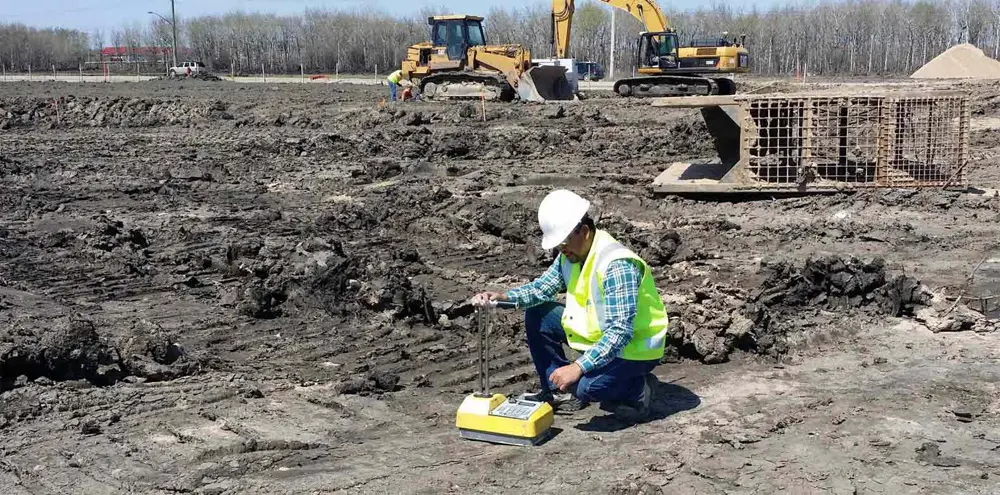Understanding the Foundations: Types of Soil Testing for Construction
In the realm of home construction, understanding the foundation is paramount. One pivotal aspect of this is recognizing the type of soil upon which the structure will be erected. The “types of soil testing for construction” provide invaluable data, ensuring the foundation is secure, and the building’s longevity is guaranteed. Without accurate soil testing for Home Construction, the integrity of any construction can be at risk.
At Jade Homes, Delhi-NCR’s best home construction company, we prioritize soil testing to ensure that our projects, from start to finish, are built on solid ground. This attention to detail and commitment to quality sets us apart in delivering impeccable homes.
Importance of Soil Testing in Building Foundations
The foundation is the bedrock of any construction. A minor flaw or damage in it can jeopardize the entire structure. Serving as the building’s shield, the foundation safeguards it from potential disturbances originating from beneath the earth. Its primary role is effectively distributing the structure’s weight to the ground.
To ensure the foundation’s strength, the soil beneath must possess the necessary physical and chemical characteristics to support the building’s weight. Soil testing and analysis are vital to gauge the soil’s settlement rate and bearing capacity. Such tests guide the determination of the appropriate depth and length of pillars for the foundation.
Soil testing is also pivotal in assessing soil moisture content, influencing the foundation’s humidity levels. Understanding how the soil behaves in varying moisture conditions is essential, especially since clay-rich soils often exhibit more movement than sandy ones.
Furthermore, clearing the site of vegetation is crucial. Residual roots or remnants of old trees can lead to soil displacement, which in turn can affect the stability of the foundation. A thorough understanding of these factors through soil testing is imperative for a solid and enduring foundation.

Types of Soil Tests in Home Construction
Soil analysis is crucial in home construction, offering insights into attributes like water content and compressive properties. By conducting these tests, potential issues during foundation laying can be identified and mitigated.
Though soil analysis forms a segment of broader environmental tests, its significance is undeniable.
Let’s delve into six essential soil tests:
1.Specific Gravity
This evaluates if the soil can stay grounded or is prone to be washed away during severe weather. It compares soil density against water, revealing if the underlying soil could liquefy during floods.The standard specific gravity of soil ideal for construction should be from 2.65 to 2.85. The soil should consist of the low-value presence of organic content, porous matter and heavy materials.
2.Dry Density
This test ascertains soil density when dry, focusing on the gaps or spaces amid soil particles. Sand tends to be more porous than clay, which has minimal voids.Density test helps to classify the soil into three types – loose, medium and dense, with the weight of the soil samples. The lesser the density, the stronger the foundation.
3.Atterberg Limits
It is used to measure the critical water content of the soil. This comprises two tests for fine-grained soils: the plastic limits and a liquid limit assessment. The latter uses the Casagrande apparatus to determine the water quantity needed to close a space after a set number of impacts. The plasticity assessment, on the other hand, gauges moisture content after moulding clay strips.
4.Proctor’s Compaction
This test gives information about maximum dry density and optimum water content of compacted soil. This method involves introducing a specific water amount to the soil, compacting it to a set volume, and then evaluating a soil sample. When visualized on a graph, density is seen as reliant on water content.
5.Moisture Content
Repeated across several tests, this analysis examines the inherent water content in soil without any external modifications, providing a look into the soil’s natural behaviour.
6.Foundation Testing
Before laying the foundation, this critical test is performed. Overlooking this step can lead to structural problems within months – imagine doors and windows getting jammed or visible cracks. Thus, consulting a geotechnical engineer for a thorough evaluation before the foundation work commences is imperative.
Conclusion
It’s crucial to underscore the importance of the “types of soil testing for construction” in laying the groundwork for any building project. These examinations offer a detailed understanding of the ground’s resilience and suitability.
Recognizing this, Jade Homes, the Best Home Construction Company in Delhi-NCR, always prioritizes soil assessments before embarking on any project. A building’s longevity and stability are deeply rooted in its foundation, and knowing the soil’s characteristics ensures a robust structure for years to come.





